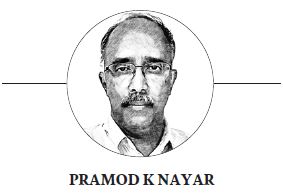Opinion: The vulnerability and necessity of Free Speech
As Nobel laureate Toni Morrison said: We speak, we write, we do language. That is how civilizations heal

By Pramod K Nayar
One of the most vulnerable domains of public life and citizenship today is free speech. A judge of the US Supreme Court, Louis Brandeis, declared:
Also Read
public discussion is a political duty . . . If there be a time to expose through discussion the falsehood and fallacies, to avert the evil by the processes of education, the remedy to be applied is more speech, not enforced silence.
Brandeis suggests that there is an overwhelming reason to defend free speech: it makes the Public. Today, the freedom of speech is being curtailed in both totalitarian and democratic regimes – and in this, they seem to be blood brothers.
Public from Reason
The principle of Public Reason states that any law promulgated by the state for reasons of harming a community, group or social segment is illegitimate. Laws that are founded on prejudice, hatred or the self-interest of the legislature, sectarian laws that are intended to harm a group are not acceptable in accordance with the principle of Public Reason. Likewise, legislation driven solely by ideological considerations is not acceptable either.
If speech is likely to produce or amplify harm — as hate speech does — then it is not acceptable. Which means: the state is well within its rights to restrict hate speech because it is likely to inspire harmful actions in the audience. But what is unacceptable to Public Reason is viewpoint-based restrictions where the state proscribes speech solely because the speech is hostile to the state’s official stance. One recalls here American legal scholar Geoffrey Stone’s famous articulation of this principle: ‘the government may not restrict expression simply because it disagrees with the speaker’s views’.
Governments hide behind the phrases ‘national interest’, ‘national identity’ and ‘national good’ as reasons to curb free speech. This is ironic given that the very core of the nation, its public, comes into being through the free and open exchange of ideas about what constitutes the public or national good. Justice Thurgood Marshall, the first African-American to serve on the US Supreme Court, defined the idea of free speech as follows:
Vigilance is necessary to ensure that public employers do not use authority over employees to silence discourse, not because it hampers public functions but simply because superiors disagree with the content of employees’ speech.
And: The government has no power to restrict expression because of its message, its ideas, its subject matter, or its content…
And further: [a]ny restriction on expressive activity because of its content would completely undercut the “profound national commitment to the principle that debate on public issues should be uninhibited, robust, and wide open.
These are still cited, if commentators are to be believed, as the cornerstone of the Freedom of Speech arguments in the USA.
Reformatting the Public
The insistence on regulating free speech because its content is not in line with the government’s official position is a means to insidiously re-forming the public for the government’s own ends.
The state often proscribes speech and opinion-making on the grounds that these hurt sentiments of a large section of the people. This is based on the paternalistic principle, as the constitutional legal scholar Wojciech Sadurski has argued, that the interests of the majority hearers are to be safeguarded over the interests of the speaker. This step tilts the weight towards a segment, albeit a majority segment, and away from the public in general. Viewpoint regulation just because the viewpoint is disagreeable (but not harmful) is unacceptable because then the public itself stays uninformed.
Governments often curb free speech in the name of ‘national interest’ or ‘national good’ which is ironic, as the core of the nation, its public, comes into being through the free and open exchange of ideas about what constitutes the public or national good
The purpose here is to skew the public debate so that, over time, the public can be made to act in ways conducive to the government’s ideological line. Perhaps the most famous examples of such a re-formatting of the public would be Nazi Germany and Rwanda. In the first, the Goebbels-led propaganda machinery proscribed diversity of views and pushed, endlessly, its anti-Semitic rhetoric for a decade before the extermination of the Jews became, in the eyes of the German public, not only acceptable but desirable. Similarly, in Rwanda, the continuous mobilisation of hatred through radio broadcasts of songs and speeches made Tutsi genocide inevitable: the Hutu public welcomed it as a measure of ethnic cleansing.
The government has a stake in controlling and manipulating the public so that Public Reason, which could counter the legislation is no longer reasonable. For too long, the Public has had viewpoint regulations that commandeered and proscribed opposing points of view.
Counter Public, the Measure of life
Public Reason, the cornerstone of democracy, can thrive only when people actually respond to prejudice in speech (which includes print, online and such too). That is, the Public comes into being not through reasoned debate alone, in Habermasian terms, but in counters to hate speech, war mongering and genocidal-ethnocidal speech intended to cause harm.
Often described as ‘speaking back’, responding to and countering hate speech, misinformation and tutored bias, is what enables Public Reason. Political Scientist and Public Policy specialist Katherine Gelber argues, ‘any individual confronted with speech they dislike, disagree with, or disapprove of, can respond in kind by answering back to, contradicting, or arguing against the earlier speaker’. So then, if it is a civic duty to respond, as Brandeis and Gelber suggest, the non-performance of this duty by us is tantamount to throwing the Public and the democracy that is built on it, away.
Admittedly, the speaking arena is not a level playing field, and all speakers do not enunciate with the same rhetorical power. But what is worrying now is not the inequality of the playing field as much as the concerted attempt to close off the field to a vast number of the public so that only one kind of voice is heard.
The necessity of speaking, continually, logically and with purpose was insisted upon by Nobel laureate Toni Morrison in a 2015 essay titled ‘No Place for Self-Pity, No Room for Fear’:
There is no time for despair, no place for self-pity, no need for silence, no room for fear. We speak, we write, we do language. That is how civilizations heal.
We may not, however optimistic Morrison is, heal the world. But the act of speaking back, and up, is perhaps what qualifies our life. The last word, again, is Morrison’s, this time in her Nobel acceptance speech where she provides a manifesto for us who still believe in the public:
We die. That may be the meaning of life. But we do language. That may be the measure of our lives.

(The author is Senior Professor of English and UNESCO Chair in Vulnerability Studies at the University of Hyderabad. He is also a Fellow of the Royal Historical Society and The English Association, UK)
Related News
-
Identity proof chaos in Bengal SIR: CEO flags irregular uploads, deadline extension on the cards
26 seconds ago -
Elderly woman dies after saree catches fire at Thane temple
3 mins ago -
Cartoon Today on February 17, 2026
35 mins ago -
Telangana student found dead in hostel at NIT Kurukshetra
2 hours ago -
Couple elected as chairperson and vice-chairperson of Nirmal Municipality
9 hours ago -
Telangana municipal polls: BRS pockets 18 municipalities
9 hours ago -
BJP draws sharp criticism for meeting Congress leaders in Hyderabad
9 hours ago -
Inorbit Mall Cyberabad hosts Valentine specials, interactive games and live performances
9 hours ago




